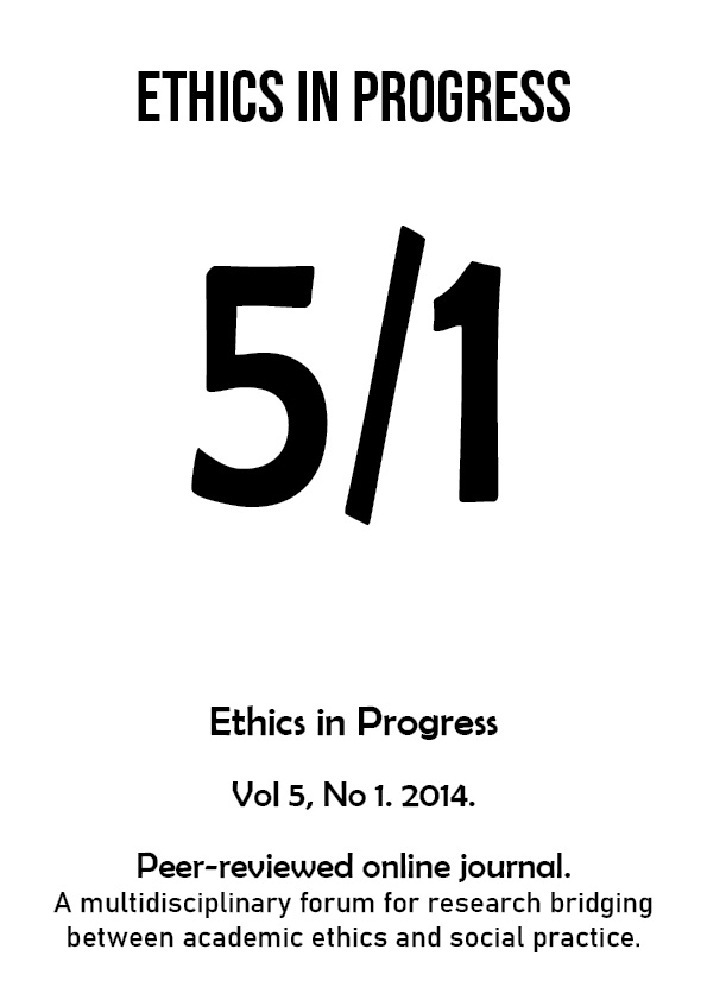Abstract
This article introduces the special issue for Ethics in Progress entitled Environment, ethics, and sustainability: Crossroads of our future. Despite four decades of intense development in the field of academic and professional environmental ethics, environmental problems pose ever increasing ethical challenges. The discipline continues to undergo a transition from focusing on theoretical questions such as what kinds of beings deserve moral standing toward greater inclusion of the multifaceted dimensions of sustainability and environmental issues and policy formation. In this introductory paper, we present the development, some of the key disciplinary debates, and the continuing and emerging challenges in environmentalism as it intersects with sustainability. We emphasize the importance of increasing the range of interdisciplinary perspectives brought to bear on practical ethics. The papers included in this special issue reflect both the challenges that arise as environmental ethics continues to expand and explore new issues at the intersection of ethics, sustainability, and environmental research, and the interdisciplinarity required in our search to better understand matters related to environmental history, environmental inequalities, social and environmental value conflict, inter-generational justice, and ethical components of the human relationship with the world.
References
Brennon, A. 2003. “Environmental Awareness and Liberal Education”. In Light, A. & Rolston III, H. (Eds.), Environmental Ethics: An Anthology. Malden,Massachusetts: Blackwell.
Brown, D. 2013. Climate Change Ethics. Navigating the Perfect Moral Storm.London: Earthscann (Routledge).
Butler, W.F. & T.G. Acott. 2007. “An Inquiry Concerning the Acceptance ofIntrinsic Value Theories of Nature”. Environmental Values 12 (2): 149-168.
Carson, R. 1994 [1962]. Silent Spring. Boston: Houghton Mifflin.
Callicott, J.B. 1989. “On the Intrinsic Value of Nonhuman Species”. In In Defenseof the Land Ethic: Essays in Environmental Philosophy. Albany: StateUniversity of New York Press: 129-55.
Callicott, J.B. & M. Nelson (Eds.). 1998. The Great New Wilderness Debate.Athens: The University of Georgia Press.
Cronon, W. 1996. “The Trouble with Wilderness; or, Getting Back to the WrongNature”. In Uncommon Ground: Rethinking the Human Place in Nature.New York: W.W. Norton and Company: 69-90.
Donner, W. 1996. “Inherent Value and Moral Standing in EnvironmentalChange”. In Hampson, F.O. & Reppy, J. (Eds.). Earthly Goods:Environmental Change and Social Justice. Ithaca, New York: CornellUniversity Press.
Elliot, R. 1997. Faking Nature: The Ethics of Environmental Restoration. London:Routledge.
Gardiner S.M. 2010. “A Perfect Moral Storm: Climate Change, IntergenerationalEthics, and the Problem of Moral Corruption”. In Gardiner, S.M., Caney,S., Jamieson, D. & Shue, H. (Eds.). Climate Ethics. Essential Readings.New York, NY: Oxford University Press.
Goodpaster, K. 2008. “On Being Morally Considerable”. In Pojman, L. & Pojman,P. (Eds.), Environmental Ethics: Readings in Theory and Application.Belmont, California: Thomson Wadsworth.
Hargrove, E. 2003. “Weak Anthropocentric Intrinsic Value”. In Light, A. &Rolston III, H. (Eds.), Environmental Ethics: An Anthology. Malden,Massachusetts: Blackwell.
Lear, L. 1997. Rachel Carson: Witness for Nature. New York: Henry Holt andCompany.
Leopold, A. 1987 [1949]. A Sand County Almanac: And Sketches Here and There.New York: Oxford University Press.
Light, A. & Katz, E. (Eds.). 1996. Environmental Pragmatism. London: Routledge.
Light, A. & Rolston III, H. (Eds.). 2003. Environmental Ethics: An Anthology.Malden, Massachusetts: Blackwell.
McShane, K. 2009. “Why Environmental Ethics Shouldn’t Give Up on IntrinsicValue”. In Spash, C. (Ed.), Ecological Economics. Critical Concepts in theEnvironment. London: Routledge.
Muir, J. 1991 [1916]. A Thousand-Mile Walk to the Gulf. San Francisco: SierraClub Books.
Muir, J. 1988 [1912]. The Yosemite. San Francisco: Sierra Club Books.
Najder-Stefaniak, K. 2014. “Value of an Encounter from an Ethical Perspective”.Ethics in Progress 5 (1): 115-124.
Norton, B. 2003. “Environmental Ethics and Weak Anthropocentrism”. In Light,A. & Rolston III, H. (Eds.), Environmental Ethics: An Anthology. Malden,Massachusetts: Blackwell.
O’Neill, J., Holland, A. & Light, A. 2008. Environmental Values. London: Routledge.
O’Neill, J. 1993. Ecology, Policy and Politics. Human Well-Being and the NaturalWorld. London: Routledge.
O’Neill, J. 2003. “The Varieties of Intrinsic Value”. In Light, A. & Rolston III, H.(Eds.), Environmental Ethics: An Anthology. Malden, Massachusetts:Blackwell.
Paddock, T. 2014. “Building within space: Thoughts towards an EnvironmentalEthics”. Ethics in Progress 5 (1): 81-97.
Pojman, L. & Pojman, P. 2008. Environmental Ethics: Readings in Theory andApplication. 5th ed. Belmont, California: Thomson Wadsworth.
Plumwood, V. 1993. “The Politics of Reason: Towards a Feminist Logic”.Australasian Journal of Philosophy 71(4): 446-447.
Proctor, J. D. 2001. “Solid Rock and Shifting Sands: The Moral Paradox of Savinga Socially-Constructed Nature”. In Castree, N. & Braun, B. (Eds.), SocialNature: Theory, Practice and Politics. Oxford: Blackwell.
Rachels, J. 2012. “Modern Ethical Theory: Introduction”. In Cahn, S. & Markie, P.(Eds.). Ethics: History, Theory, and Contemporary Issues. New York:Oxford University Press: 451-460.
Robinson, J. 2004. “Squaring the Circle? Some Thoughts on the Idea ofSustainable Development”. Ecological Economics. 48 (4): 369-384.
Rolston III, H. 2008. “Naturalizing Values: Organisms and Species”. In Pojman, L.& Pojman, P. 2008. Environmental Ethics: Readings in Theory andApplication. 5th ed. Belmont, California: Thomson Wadsworth.
Salwa, M. 2014. “Historic Gardens as Places of Conflicting Values”. Ethics inProgress 5 (1): 98-114.
Söderbaum, P. 2008. Sustainability Economics. Towards Pluralism in Economics.London: Earthscan.
Sylvan (Routley), R. 2003. “Is there a Need for a New, an Environmental Ethic?”In Light, A. & Rolston III, H. (Eds.), Environmental Ethics: An Anthology.Malden, Massachusetts: Blackwell.
Thoreau, H. D. 1993 [1862]. Walking. In Civil Disobedience and Other Essays.New York: Dover.
Tyburski, W. 1990. O idei humanizmu ekologicznego. Warsaw: TowarzystwoWiedzy Powszechnej Zarząd Główny.
Vilkka, L. 1997. The Intrinsic Value of Nature. Amsterdam: Rodopi.
Zimmerman, M., Callicott, J. B. Sessions, G., Warren K. & Clark, J. (Eds.). 1993.Environmental Philosophy: From Animal Rights to Radical Ecology.Englewood Cliffs, New Jersey: Prentice Hall




